 Do I really need to talk to people I disagree with?
Do I really need to talk to people I disagree with?
It's been a couple of weeks but today, I want to offer another installment of "How do we live in these days?" If you missed the last post about privilege, you can read it here.
I’ve been thinking a lot this week about how easy it is for you and I to stop talking to one another when we don’t agree especially now in times like this.
And, I’m wondering- how many times in the past couple of months have you blocked or hid friends on Facebook after they posted that article or meme for the 40th time about a political idea you don't agree with? Or been leery of going home and sitting around a family dinner table because you know that ___ will be there and say something you find offensive?
I know this much is true: lively, respectful, conversation is an art form that has grown harder and harder to engage in by the day.
Sharp edges are everywhere.
We are all prone to shut down on arrival.
It just seems easier to keep our mouths shut and stick close to people like us.
When I was preparing to preach last Sunday at University Christian Church in Hyattsville, MD I sat close to the story of the Samaritan Woman for the week and felt convicted all over again about Jesus' example of what it means to be in conversation people for whom I might disagree.
In John chapter 4, we read that Jesus and his disciples were on the road and they’re running low on supplies. Verse 8 tells us that the disciples take a detour into town to buy food. But Jesus hangs back. It has been a busy couple of days. And he realizes that a moment of rest might do him some good. It’s around lunchtime. The sun is out. It’s the hottest time of the day. Jesus looks for some shade and finds it close to a well.
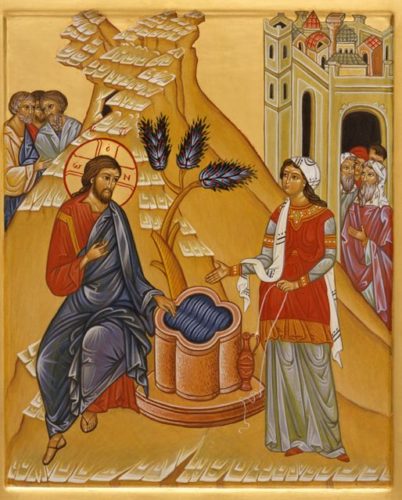 BUT then, a woman approaches fetching water. She has a bucket. Jesus does not. Jesus has been thirsty for quite some time. He asks the woman to get him a drink of water. A conversation between an unlikely pair begins!
BUT then, a woman approaches fetching water. She has a bucket. Jesus does not. Jesus has been thirsty for quite some time. He asks the woman to get him a drink of water. A conversation between an unlikely pair begins!
I say unlikely because it would have been the cultural norm for Jesus just to ignore this woman. (Please note: John does not even give us her name!) Take a nap. Keep to himself. Save his energy for a larger scale teaching engagement. After all, he is a Jew from Galilee and she is a woman from Samaria. Men and women, non-related at this time did not converse in public places. Nor did Jews and Samaritans.
But it was time to talk. And as much as the woman wanted Jesus to focus on the literal, the substance of the water, Jesus carefully moved the conversation to the soul.
To get to this deeper place, Jesus speaks to her more personally.
I can imagine he looks her directly in the eyes and tells her that she’s had 5 husbands and the man she’s living with now is not her husband-- all to the amazement of the woman. It was true!
I read an article this week by John Piper, a conservative theologian for whom I usually disagree and his take on John 4 is no exception. He calls the woman in the passage a “worldly sensually-minded, unspiritual harlot from Samaria” and later he refers to her in his sermon as a whore. He makes the point that Jesus is lavishly lowering himself to her level. And that in her sin, Jesus is calling her out and hoping she’ll accept his invitation of eternal life.
And even if you and I don’t use such strong language about her as Piper does, I believe we’re also prone to look down on her too? Many of us equate the Samaritan woman with a prostitute even though the language of the text does not contain this word.
Yet in our judgment, we overlook so much of the cultural context of this story.
Professor David Lose further explains: “She very easily could have been widowed or have been abandoned or divorced (which in the ancient world was pretty much the same thing for a woman). Five times would be heartbreaking, but not impossible. Further, she could now be living with someone that she was dependent on, or be in what’s called a Levirate marriage (where a childless woman is married to her deceased husband’s brother in order to produce an heir yet is not always technically considered the brother’s wife). There are any number of ways, in fact, that one might imagine this woman’s story as tragic rather than scandalous, yet most preacher’s assume the latter.”
But Jesus shows the way of love. Jesus never calls her out as a sinner. Jesus never asks for her repentance. Jesus never focuses on the fact she’s had 5 husbands other than the fact that it’s just details in her story.
Jesus offers dignity.
We don’t hear him talking down to her, looking down on her or saying, “Well, I’m Jesus so I’m of course I'm better than you—so you stay over there while I stand here.”
No! Not at all. Jesus sees her for her. What a powerful moment this!
A bridge of relationship forms because a conversation is not just exchange of words between two people but a connection. An authentic connection.
My friends, isn’t this what our world needs more of from us as people of faith?
Conversations partners with willingness to put barriers aside and just listen.
Conversations partners who show up to listen and not judge
Conversation partners who love before we’re quick to condemn
Dan Kimbell in his book, Adventures in Church Land says this: “Many of us have so few friendships with others outside the church so that people see only the aggressive street evangelists or a pastor on the news who got caught in some scandal or who is being interviewed and saying some nutty things. If people don’t see normal, day-to-day examples of real-life Christianity, then we shouldn’t be surprised if the scandals and the extreme voices end up defining their view of the church.”
Or in other words, what are we doing to be conversation partners with those who most need to be seen, loved and understood (even if they're different from us)?
I believe keeping conversation alive IS the way we live in these days. Who do you need to talk to?
For those of you who are newer readers to the blog you may not know where the name "Preacher on the Plaza" came from.
All of this blogging started in 2009 when I became the pastor of Washington Plaza Baptist Church-- a lovely little congregation that sat in the middle of Lake Anne Plaza in Reston, VA. Want to read about my first days on the job and more about the church? Click here.
So, it seemed fitting that if I was going to blog about my work with Washington Plaza, then the name "Preacher on the Plaza" would be the best choice considering I was pastoring THE church on this famous Reston plaza.
But as I left this church in 2012 and made the move to Oklahoma for things to come, the name stuck around.
It seemed that the more I sought to figure out life and ministry, the places I felt called to the most were outside of the church. . . . while keeping one foot in the door of it too.
A couple years ago, when I redesigned my blog in this format, I asked my friend Scott Henrichsen to take some pictures that would reflect the theme (thus the header I use today). It was a very cold, cold day in downtown DC near K street. But you can't tell it from how he organized the photos.

But much as has changed in my life since then-- three years in Oklahoma and now back in DC-- so I thought it was a great time to re-do some of the images.
So this week, Scott and I hit the streets again this time in DC in the Eastern Market area. It turned out to be a much different shoot than before. Mostly because it was a beautiful day in the city and folks were a lot more willing to chat!
Scott told everyone that I was a "street preacher" to which I had to correct him and laugh every time (You know, I'm not the stand on the milk crate, hell fire and brimstone type) and that he was taking pictures for the Preacher on the Plaza blog.
We're really not as scary as people think. We eat and breathe like everyone else. And we might just be fun to talk to!
So, first, I chatted for awhile with this father and son in DC from down South, who were celebrating the award of one of their family members who just received an national honor of parent of the year.
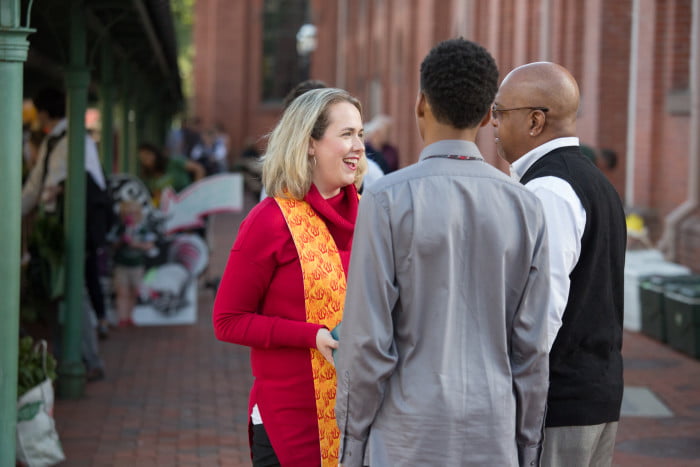
It so easy to bond with people over the dogs, like I did with this couple out getting ready to buy some fresh vegetables at the open air market. Though you can't see their beautiful pup in this photo, "Joe" was a cutie!
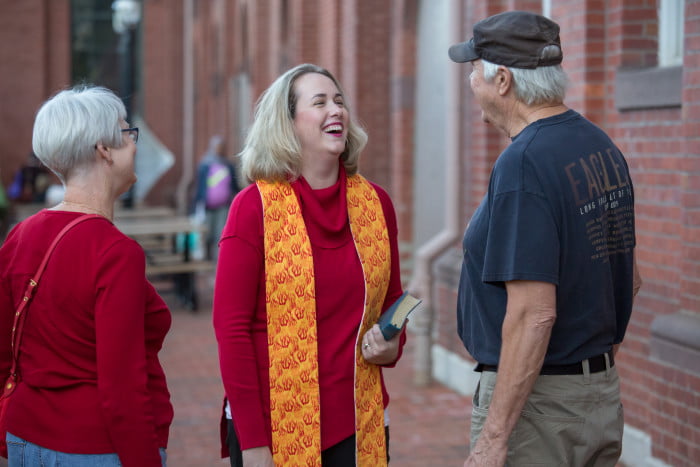
Then, I met this couple who was visiting the DC area from Pennsylvania and really happy to be doing some shopping in the city.
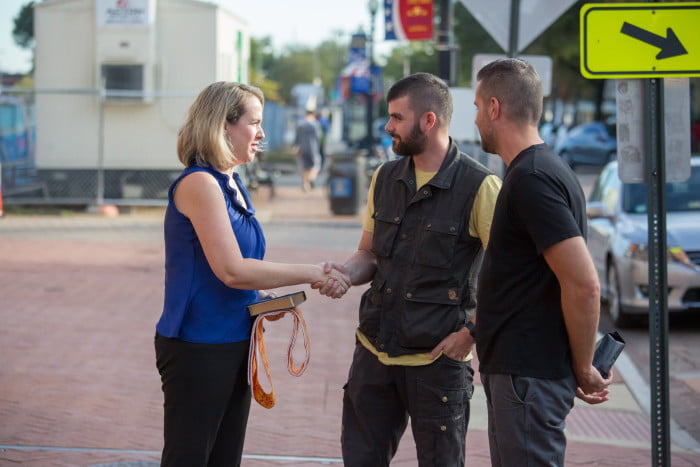
I then began talking to this man who plays his guitar every afternoon in Eastern Market but spends his weekends in Georgetown, playing there because the tips are better.
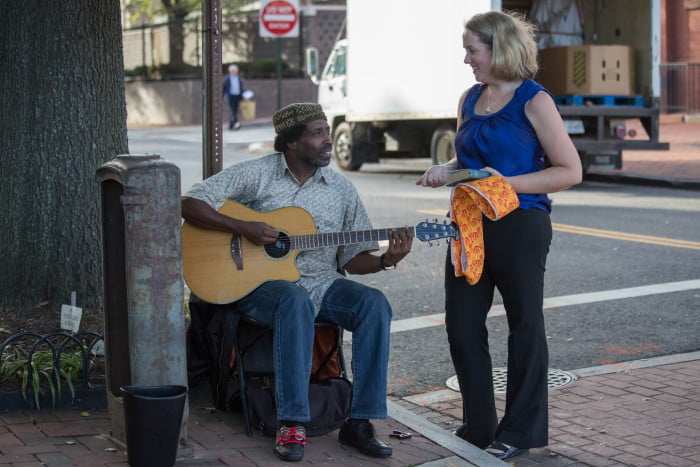 He then asked me if I knew any church songs, to which I said yes!
He then asked me if I knew any church songs, to which I said yes!
"Do you know Amazing Grace?" he wondered. "Of course I know it," I answered.
"Then, you're going to sing it and I'm going to play!" He told me.
Big gulp!
So, right here on this street corner, I sang Amazing Grace.
What you can't tell from the picture is that a flock of 5 year old karate students passed by and wondered what in the world was going on!
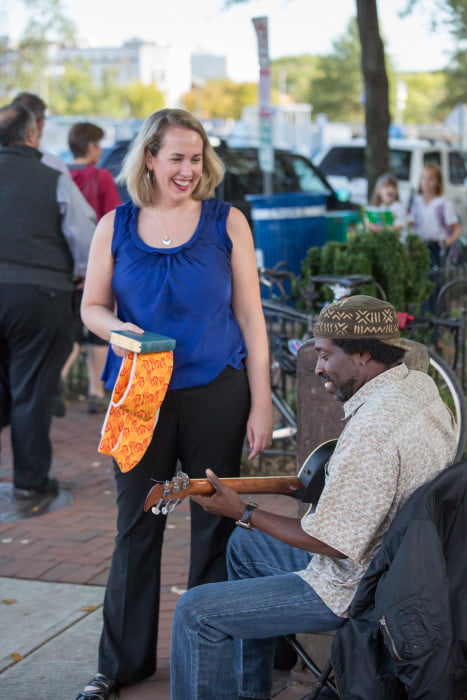
What a blast that was!
Then, I was able to meet this young couple expecting their first child. I heard stories from the mother-to-be about her grandfather that was a Lutheran but also a "Pentecostal, full of the Holy Spirit" kind of preacher. "He was such a great man!" she added, "People loved him."
 They were so interested in what kind of pastor I was and asked me several questions of about what kind of ministry I do. She wrote down the address of my blog. So, if you are reading right now-- it was great to meet you!
They were so interested in what kind of pastor I was and asked me several questions of about what kind of ministry I do. She wrote down the address of my blog. So, if you are reading right now-- it was great to meet you!
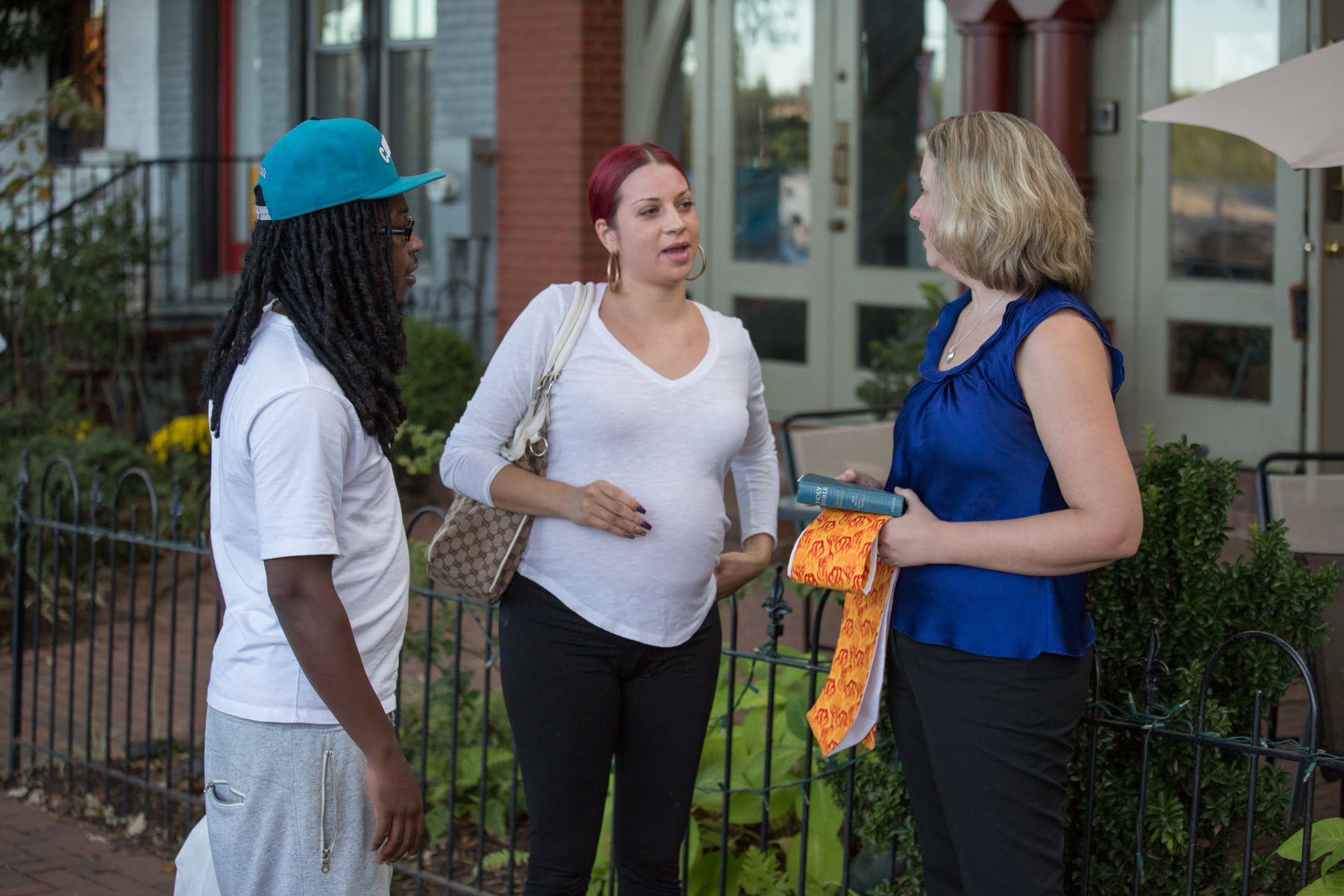 Maybe I should get out to the plazas more often. What beautiful people I met! Thanks to Scott for the capturing the moments!
Maybe I should get out to the plazas more often. What beautiful people I met! Thanks to Scott for the capturing the moments!
A Sermon Preached at The Federated Church, Weatherford, OK on Luke 24:13-33
 There’s a country song by Miranda Lambert that I became familiar with several years ago. I loved when it first came on the radio because it reminded me so much of the small town in Georgia where Kevin grew up and we were married. Maybe the words of, “Famous in a Small Town” might remind you of what it’s like to live in Weatherford.
There’s a country song by Miranda Lambert that I became familiar with several years ago. I loved when it first came on the radio because it reminded me so much of the small town in Georgia where Kevin grew up and we were married. Maybe the words of, “Famous in a Small Town” might remind you of what it’s like to live in Weatherford.
I dreamed of going to Nashville
Put my money down and placed my bet
But I just got the first buck of the season
I made the front page of the Turner "Town Gazette"
Tyler and Casey broke up
It ended pretty quietly
We heard he was caught red-handed with her mama
That's just what they let us all believe
Every last one, route one, rural heart's got a story to tell
Every grandma, in law, ex girlfriend
Maybe knows you just a little too well
Whether you're late for church or you're stuck in jail
Hey words gonna get around
Everybody dies famous in a small town.
And if any of these words call to mind experiences you’ve had, then you’re right on track for understanding the mood of our gospel lesson for this morning. For in a small town outside of Jerusalem, word had gotten around town and somebody named Jesus just died famous.
And so, on Easter evening, it was all the talk at the local gathering places. It was all the talk at the village market. It was all the talk as the kids began to stir again after they’ve were cooped up by their parents during the Passover festival for days.
It was all the talk as two men, one who we know as Cleopas and the other without a name travel on the road from Jerusalem to Emmaus. Jesus had just died and there was so much gossip to sort through!
And it all got all the murkier when another traveler started walking beside them. He overhears their conversation and approaches them with the question, “What are you discussing with each other while you were walking along?”
The travelers having no idea that Jesus—the man who had supposedly died—is among them. So Cleopas answers him saying, “Are you the only stranger in Jerusalem who does not know the things that have taken place there in these days?”
Or in other words, “Have you not been on Jerusalem’s Facebook page? Didn’t you see the nightly news? Have you not read the newspaper? EVERYONE knows what happened to Jesus . . .” the man who was mighty in deed and word before God and all people, the man that we hoped would be the one who would redeem Israel” but is no longer with us.
Oh, kind sir, do you live under a rock??
It’s a great sketch for a comedy show, isn’t it?
But Jesus plays along, listening carefully until it was his turn to speak. He’s got a lot to say, though not what you might think. Jesus does not tell the men who is. But, rather, he begins his teaching session.
I can imagine that these two disciples were pretty smart guys. The traditions of ancient scripture meant something to them. They’d heard these stories before. And they were all ears!
He walks these two through all the prophecies of old beginning with Moses. He carefully outlines for them how the prophecies foretold the coming a Messiah who would endure suffering and death but would rise again. He enlivens their hopes with the joyous possibilities that Jesus could be alive!
Just like some of us might feel going to a convention or a conference in our chosen profession, surrounded by thousands of people who think and engage the world like us, so these disciples were “geeking out” on Jesus. They could not get enough of what he was saying! Being with such a wise teacher with such a commanding presence was just so sweet! They wanted to learn as much as they could. So that when they finally reached their destination, they didn’t want their night with Jesus to end.
I know the feeling don’t you? Being engulfed in a conversation that you wish could go on forever or at least late into the night.
As for the disciples, they try to come up with whatever they can to keep things going longer! Verse 29 tells us that “they urged [Jesus] strongly, saying, ‘Stay with us’” And so Jesus did.

Conversation that was beyond the superficial stuff we normally fill the airwaves with the most—
“I am making chicken for dinner with a new recipe I just saw online” and “I bought a really nice pair of shoes today on sale.”
Conservation that was beyond the stuff we talk about when we think we’re talking about something more important—
“My son is was offered a new job last week that will give his family more financial security” and “Retirement really does suit me; I like not having to get up early in the mornings.”
Conversation that was beyond even the stuff we talk about in religious circles—
“We need to pray for so and so who is sick” and “I really liked that Bible study. Can we do something like that again?”
No, the conversation between the two disciples and Jesus that day was a heart to heart. It was conversation that touched tender points of discouragement, dreams and fears within their souls. It was a conversation that they needed answers on and needed answers now. For their beloved teacher had died and nothing would ever feel the same without him.
So, what really did all of this news around town mean?Jesus gave answers that were profound and like none they’d ever heard. And it was a lot to take in—so much so that they were in the dark about the LIGHT walking alongside of them for most of the talk until . . .
POOF! They all sat down together at the table, broke bread (which has a lot of unspoken allusions to our communion meal) and verse 31 tells us that “Their eyes were opened and they recognized him.”
Jesus vanishes—for his conversation task was over.
And we see the significance of what just occurred as the disciples respond to what has just happened to them.
I resonate so deeply with this verse of scripture because I feel so much it’s what my work as pastor/ preacher is all about. If I am going to be a leader who helps a congregation have an experience with Jesus then I’ll know that I’ve done my job if they reflect back to me a version of your “hearts burning within you” story while I’ve been teaching.
I also resonate with me because I feel my own faith journey is rooted in conversation. I am who I am because of the countless folks I’ve encountered in my life who felt enough conviction about their faith to talk to me about it.
And in everyday life, when you and I break bread together or enjoy a cup of coffee and I can share my stories with you and be heard with empathy and you can share your stories with me and be heard with compassion—then to me this is a Road to Emmaus experience. We both learn something new for the journey. Why? Because Jesus is present! And what’s better than that?
But as much as I share my excitement for conversation with you this morning, I also know that for some of you it’s not your style.
You speak when spoken to. You share your deepest thoughts to someone maybe once a year. And a room full of people having conversation about a book or a faith experience makes you want to run for the hills and not come back till the room is cleared out. (And I affirm you though I might not understand you as much as I do the sharers).
Because my friends, when resurrection comes to your life and mine, and I mean, mind boggling, I can’t believe this is happening, I never thought this was possible kind of new life resurrection, then you can’t NOT talk about it. It’s just too good news to share!
Jesus was alive and he couldn’t not converse with these disciples about the good news!
The disciples loved Jesus and they couldn’t not converse with one another about all that Jesus had meant in their lives!
And for all of us who’ve had a resurrection experience, we can’t not talk about it with each other.
When I was in Christian History class in seminary, one particular saint story caught my attention and it came from the life of Teresa of Avila.
Teresa, if you don’t know about her was a nun within the 15th century. Her writings like “The Inner Castle” make famous her mystical experiences of God in prayer. Teresa is a “straight from the hip” kind of saint especially on matters of prayer and what being in the presence of God feels like. In her time, people thought she was crazy sometimes because she endured great bouts of depression and sadness. But regardless of what others said about her “resurrection experiences” she was authentic voice during a difficult time in the church. She eventually became known as a great church reformer, though not given any recognition for such during her lifetime.
And this is one of her famous prayers: “Christ has no body now but yours. No hands, no feet on earth but yours. Yours are the eyes through which he looks compassion on this world. Yours are the feet with which he walks to do good. Yours are the hands through which he blesses all the world. Yours are the hands, yours are the feet, yours are the eyes, you are his body. Christ has no body now on earth but yours.”
Isn’t it just beautiful?
Though we might be afraid to talk about what God is doing in our lives, Christ has no body now in this place and time than yours.
Though we might not want to be perceived as the “overly religious one” in a group as the one who stops to pray when something good happens, Christ has no hands on earth but yours.
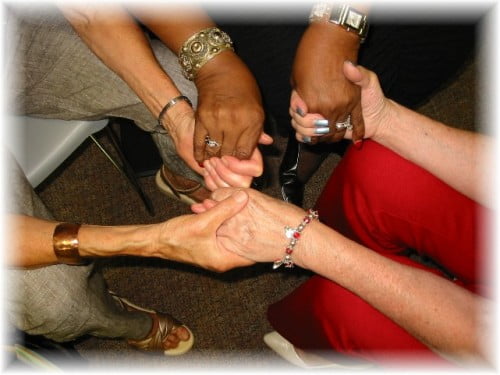
Though we might not want to offend someone by bringing up the good news of what is happening in our church to someone who hasn’t been here in a while, Christ has no feet on earth but yours.
And I say all of this with an understanding of the context where I am preaching. This is Oklahoma. Christianity is everywhere. People pray before meals at restaurants all the time. People talk about this and that event with their church all the time. People quote Bible verses in places of secular business all the time.
I’m not talking about any of that.
I’m talking about the stuff of our lives that is deep and profound. The stuff that keeps you and me up at night. The worries that trouble our souls and make us want to weep—all the stuff that the disciples had at the forefront of their minds on the road to Emmaus that day.
When that stuff bubbles up and when God does a work in you or you’re desperate for God to change something in you, then you’ve got to talk about it.
Resurrection is not a silent way of life. It’s a vocal one.
It’s a way of life that comes not only in words but gestures of the heart, gestures like invitations to dinner. Gestures like long meals unrushed toward what comes next. Gestures like speaking truth when it wells up in our throats, “Were not our hearts burning within us while we talked?”
So, my friends, Christ has no body on earth but yours—so if we want our message of God’s love and acceptance for all to spread, then let’s start talking!
Christ is risen. Christ is risen indeed! We've got a great story to tell as it unfolds in you and me!
AMEN
As a pastor, I live in a unique place as a person of faith.
Whereas most have particular views on any given subject and go through ups and downs in their spiritual journey, my life of faith is a public one. I am asked every Sunday to give testimony to the gospel and God's workings in the world. I preach in times of great spiritual summer and also in seasons of great spiritual winter too. I preach in my own seasons of joy and in those of doubt. My calling is to use my voice to speak no matter what. And so you hear it. You know me.
Also, I blog as well in an effort to be on an authentic, transparent journey as a religious leader. As a writing Rev., it is easier to attack me than it might be of others with the same beliefs, convictions or theological leanings. It is very easy to figure out (if you want to) my thoughts on this or that-- though I write with the disclaimer that the views shared on this site are my own and not necessarily that of my family members, my congregation or even all people of faith.
In all of this, I speak and write for myself with the knowledge that one day I will have to give an account for my life before God for everything I've ever said or done, just like everyone else. But, some people don't want God to do the judging-- they want to do it.
I was in a situation recently where I was accused of not being a Christian simply because I shared a more inclusive view of scripture. It was said that I am not a person who believes in the teachings of Jesus. And while I respect the religious freedom of any who have the right to believe as they do, it was more disconcerting that a religious litmus test still thrives and is encouraged in our modern times. While such a comment was nothing I've never heard before (hey, you don't get to be a female Baptist pastor without a few battle scars), it was disconcerting to me that this is where we still are as a Christian people. Pointing fingers. Throwing down the trump card. "I don't like what you believe so I'll say you aren't a Christian."
I would never to presume to assert my interpretations of scripture-- and the inclusive message of Jesus that I see clearly laid out-- on others in a "you aren't a Christian" sort of way. Part of being a Christ follower is seeing the God-given light in others, no matter what. And, above all, I believe any who follow Jesus are asked to respect one another, even when we just have to agree to disagree.
While my first response is "Hello! I am a pastor. I love Jesus. Do you really want to call me of all people not a Christian?" I thought I might use this opportunity to open up a conversation with all of you. So I ask, what makes a person a Christian? And do any of us have the ability to judge our neighbors faith? Is this something that the church should be about?
I am really interested to hear what you have to say. Let's talk, but respectfully with one another!